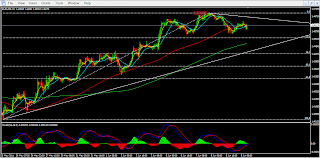 I recently came across this strategy, it works relatively good. This is great system for people looking to Scalp the market for short gains 10-15Pip's with 10-15SL max. OK 1st thing you may know, Japan yens have a correlation, especially with the Euro-Yen and Pound-Yen. So we are going to use these 2 pairs together since they really act like twin sisters.
I recently came across this strategy, it works relatively good. This is great system for people looking to Scalp the market for short gains 10-15Pip's with 10-15SL max. OK 1st thing you may know, Japan yens have a correlation, especially with the Euro-Yen and Pound-Yen. So we are going to use these 2 pairs together since they really act like twin sisters. Entry/Exit rules for Buy trade
Buy Entry - Wait for blue Heineken Ashi candle + green dot + make sure the green RSI is crossed over the Pink base line.
Buy Exit - If red Heineken Ashi candle forms or if Pink dot appears or if Green RSI crossed below the Pink Base Line.
Entry/Exit rules for Sell trade
Sell Entry - Wait for red Heineken Ashi candle + Pink dot + make sure the
Green RSI is crossed below the Pink base line.
Sell Exit - If Blued Heineken Ashi candle forms or if Green dot appears or if Green RSI crossed above the Pink Base Line.
Stoploss & Targets
No recommendation for stoploss, thats is up to you. For Targets, If you want you can wait for the exit terms and eat the whole pie or if you want you can hit n run 10-20pips on every trade signal and take bites, its all up to you.
Buy Exit - If red Heineken Ashi candle forms or if Pink dot appears or if Green RSI crossed below the Pink Base Line.
Entry/Exit rules for Sell trade
Sell Entry - Wait for red Heineken Ashi candle + Pink dot + make sure the
Green RSI is crossed below the Pink base line.
Sell Exit - If Blued Heineken Ashi candle forms or if Green dot appears or if Green RSI crossed above the Pink Base Line.
Stoploss & Targets
No recommendation for stoploss, thats is up to you. For Targets, If you want you can wait for the exit terms and eat the whole pie or if you want you can hit n run 10-20pips on every trade signal and take bites, its all up to you.






